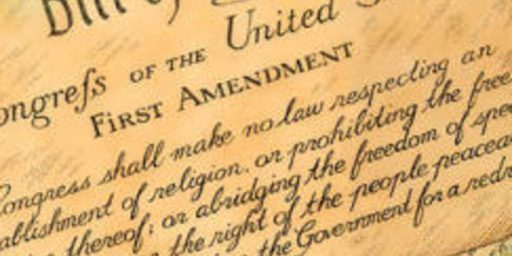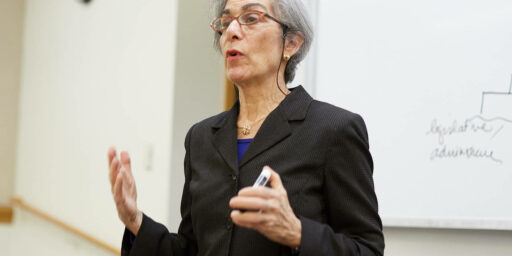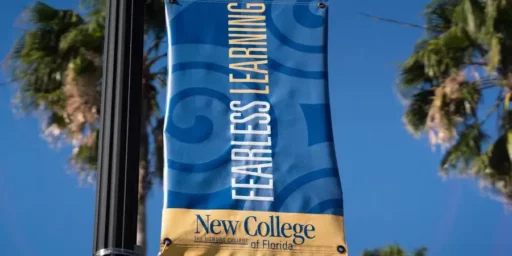Columbia Prez: Professors Should Not Use Podium as Ideological Platform
Columbia University president Lee C. Bollinger argued in a speech last night that academic freedom is limited.
Columbia Chief Tackles Dispute Over Professors (NYT)
Faced with complaints that Columbia University has tolerated anti-Semitism and intimidation in its Middle East studies classes, Columbia’s president said last night that academic freedom has some limits when it comes to the classroom and the broader educational experience. “We should not elevate our autonomy as individual faculty members above every other value,” the president, Lee C. Bollinger, said in a speech to the Association of the Bar of the City of New York. Professors, he said, have a responsibility “to resist the allure of certitude, the temptation to use the podium as an ideological platform, to indoctrinate a captive audience, to play favorites with the like-minded and silence the others.” Arguing that the health and vigor of universities rests on their scholarly professionalism, Mr. Bollinger said that when there are lapses, they should not be “accepted without consequences.”
His remarks came as Columbia awaits the report of an internal committee set up to investigate charges by some pro-Israeli students that they had been intimidated in classes by pro-Palestinian professors in the department of Middle Eastern and Asian languages and cultures and outside the classroom as well. They also said that this occurred for several years and that Columbia had not taken their charges seriously. Their complaints were made public in October in a videotape produced by a pro-Israeli group based in Boston. The video prompted criticism outside the university and within, as well as countercharges from other students and professors who said that such intimidation had not taken place. Some of the professors accused of anti-Semitism say they have been swamped with hate mail. Although Mr. Bollinger did not comment last night on what the report is likely to say, he said it was “simply preposterous to characterize Columbia as anti-Semitic or as having a hostile climate for Jewish students and faculty.”
Still, he seemed to signal that if the committee found that professors had not been behaving professionally, the university must take it seriously, although he did not spell out what he might do. “We should not say that academic freedom means that there is no review within the university, no accountability, for the ‘content’ of our classes or our scholarship,” he said. “There is a review, it does have consequences, and it does consider content.” Mr. Bollinger said that he was not preventing professors from expressing their opinions in the classroom, but that there were boundaries. “The question is not whether a professor advocates a view,” he said, “but whether the overall design of the class, and course, is to explore the full range of the complexity of the subject.”
While I don’t disagree that professors have an obligation to cover the competing theories relevant to a given course of study, it’s entirely unclear to me how this would be enforced. Surely, university administrators with zero subject-matter competence are not the ones to do it.
Columbia Leader Speaks on Academic Freedom (Guardian-AP)
Professors have a responsibility to resist “the temptation to use the podium as an ideological platform,” Columbia University’s president said, days before the anticipated release of a report investigating charges from Jewish students accusing pro-Palestinian professors intimidating them in classes.
Academic freedom limited: Columbia leader (UPI)
He also said the academic community should be the one to decide when problems occur. “We must and will be the ones to do it. Not outside actors, not politicians, not pressure groups, not the media. Ours is and must remain a system of self-government.”
So, he believes in academic freedom in terms of insulation from non-academics but not in terms of actual academic freedom for professors? Most odd.






Maybe I drank one to many beers as an undergrad or failed to show up for enough classes, but I never noticed the liberal bias on campus —- in law school (despite the fact that the school I attend is conservative by law school standards; still liberal though) that I learned how biased some profs can be — many are not but some are so biased that despite anonymous grading you had better write your answers in such a way as to ensure the prof thinks you are a bleeding heart liberal
– it worked for me in a class w/ a very outspoken family law prof who bisexual who let her politics be known — I sucked up my pride and wrote my answer as if I were a lesbian liberal —- got the highest grade (and my answer was not even that good)
— bias in undergrad and grad? I am convinced.
I think this may be less of a problem to some degree by area of study, and by region, and maybe to a degree the type of school it is.
Some of my classes I couldn’t have told you what the politics were of my teachers, others I could. I had a women’s issues class, which was good in some respects, but the teacher had an agenda and pushed it (very feminist), and I was a criminal justice major and some of my instructors let their politics come out some in their teaching, although we actually had a pretty good mix of conservative/liberals in my department, so the views were actually kind of balanced.
I think where this is probably the most prevalent are in the various cultural/gender studies departments, and my only exposure resulted in a fairly biased presentation (although I can’t say that the teacher held opposing views against you).
I did have a biology teacher that was very anti Christian, and fairly offensive, but nothing was ever done about complaints, so those of us who were Christian just endured. He actually was a fairly good instructor as far as the subject was concerned, it was just a shame he couldn’t keep his views on religion out of his lectures.
Bollinger must fear for his job. While at Univ. of Michigan, he was associated with every leftist cause possible. What happened at Columbia to change his spots?
The question isn’t one of left or right, but how to make a better Academy where students are part of the process. Bollinger seems to be on the right track–let’s see how he reacts to the Ad-Hoc committee’s report.